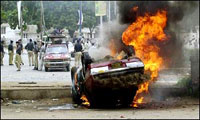Suicide bombers kill up to 35 people in Pakistan
Thirty-five people were killed in a suicide bombers’ attack targeted at intelligent agency employees and a checkpoint near the headquarters of the Pakistan army.

The two attackers struck in Rawalpindi, a garrison city just south of the capital, Islamabad. Two senior intelligence officials - one of them at the scene - said at least 35 people were killed. They asked for anonymity because of the sensitivity of their work.
The army said it could only confirm 15 killed in the attack on the bus, in addition to the suicide bomber. It said two security forces personnel were critically injured in the second attack, and the suicide bomber died.
"We suspect that pro-Taliban militants who are fighting security forces in our tribal areas are behind this attack," the intelligence official said, adding the injured and dead were being transported to hospitals.
In the first attack, an explosive laden Suzuki van rammed a bus carrying employees from the Inter-Services Intelligence agency. The other bomber hit an army checkpoint in another part of the city about 10 kilometers (6 miles) away, said Mohammed Afzal, a local police official. He provided no further details.
The intelligence agent at the scene said the destroyed bus was a 72-seater, but that it was badly overloaded and that more people were believed to be on board. The army said that only 50 people were riding on the bus.
After the blast, troops and police quickly cordoned off the area of the blast. They pushed back bystanders and snatched cameras and mobile phones from journalists and bystanders. Agents fanned out across the area, picking up metal bits of what appeared to be the suicide bomber's car.
Shoaib Abbasi, owner of the Oriel guesthouse across from the ISI compound, said that when he came out on the street after the blast the bus was burning fiercely.
"Firemen tried to open the emergency doors while they were dousing the interior, but I can't believe anyone inside survived because of the intensity of the fire," he said.
Hizer Hayat, the owner of a nearby grocery, said the blast occurred at 7:40 a.m. as he was opening the store. "After the explosion, I went out on the street and found the ignition switch for a car amid the debris (which) I later gave to an intelligence agent," he said.
It was the second major attack against the ISI in recent months. On Sept. 4, a suicide attacker blew himself up after boarding a bus carrying ISI's employees, while a roadside bomb went off near a commercial area in Rawalpindi minutes apart, killing at least 25 people.
Islamic militants have launched dozens of suicide attacks this year. Most have taken place near the Afghan border, but several have taken place in the country's main cities, raising fears that violent extremism is spreading.
A bomber blew himself up in Rawalpindi on Oct. 30 at a checkpoint several hundred meters (yards) from the office of President Gen. Pervez Musharraf, killing seven people. That office was in a building complex known as Army House, about 5 kilometers (3 miles) from the army headquarters where Saturday's second blast occurred.
Two weeks earlier, a suicide attack on opposition leader Benazir Bhutto's homecoming parade killed more than 140 people in Pakistan 's southern port city of Karachi .
Authorities cited the risk of further attacks when they barred Bhutto from holding a rally in Rawalpindi last month against Musharraf's imposition of emergency rule.
Tension between militant groups and the military are at a high because of an ongoing military operation to sweep the followers of a pro-Taliban cleric from the northern Swat valley, where authorities say more than 300 militants have been killed in recent weeks.
The violence comes as Pakistan remains under a state of emergency, a move by President Gen. Pervez Musharraf that has prompted stiff criticism of the military ruler, including from his key Western ally, the United States .
Musharraf declared the state of emergency on Nov. 3, justifying it by citing the escalating danger posed by Islamic extremists. But his critics have noted many of his moves have been against political opponents, including members of the judiciary, journalists and other moderates, rather than militants.
Subscribe to Pravda.Ru Telegram channel, Facebook, RSS!




